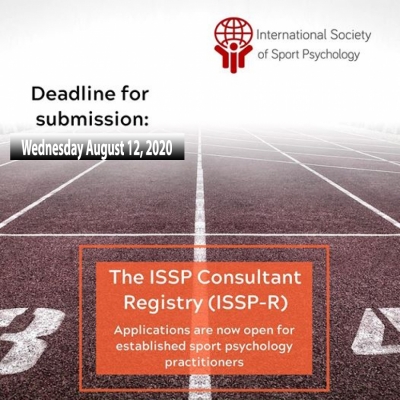Applications are now open for established sport psychology practitioners
ISSP is pleased to announce that applications to the ISSP-Registry (ISSP-R) for established practitioners is now open. Please refer to the ISSP-R section of the website for full details; however below is some of the key information
There are two routes to being accepted onto the ISSP-Registry – the Established Practitioner route and the Emerging Practitioner route. Presently, we are only accepting applications for the Established Practitioner route in this round. The deadline for submission of applications will be Wednesday August 12, 2020. We appreciate that many practitioners who also have academic roles will be entering into both a busy and unusual period with student education and assessments, and therefore we want to offer at least 2.5 months to allow sufficient time for an application.
The Established Practitioner route to ISSP-R is for those well-established practitioners (i.e., greater than 8 years of consulting experience post-MSc degree qualification) to apply to the Registry in recognition of their longer standing work in the field. This route will be time-limited, but it is important to encourage our more senior colleagues to become part of the ISSP-Registry and continue to serve as role models for the profession. On the website, applicants will find several documents that will be helpful in understanding the criteria and process, as well as two sets of example applications. Please read through the criteria to judge whether you feel an application as an Established Practitioner is the right route for you. Later in the year we will be launching the Emerging Practitioner route.
—————————————————————–
Important Disclaimer
Safeguarding Clients and the Profession: Professional liability insurance and criminal records checks
Purchasing and maintaining Professional Liability or Indemnity Insurance for a practitioner in one’s country to cover one’s work domestically, or abroad is viewed as an important professional responsibility by ISSP. However, we appreciate cultural differences and the role of any national standards/guidelines or norms for insurance in the country where the consultant resides. On this basis, we have not mandated evidence of a professional insurance policy as part of an ISSP-R application, but we encourage all potential employers and clients to ask practitioners about such insurance as a matter of due diligence.
Equally, the procurement of criminal records checks by employers or organisations as part of the process of ensuring the safeguarding and welfare of its athletes is an important step in practitioner recruitment. The protection of vulnerable clients in sport (both young athletes and adults) is critical to ISSP’s duty of care; however we appreciate that not all countries or organisations require or apply criminal records checks for employment of practitioners. In addition, if ISSP mandated evidence of a criminal record/government check to be submitted as part of an ISSP-R application, then it would be only current from the date of submission. Hence, we have not mandated evidence of such a check as part of an ISSP-R application, but we encourage all potential employers and organisations to consider such checks as part of their recruitment process.
Accreditation Committee
Professor Chris Harwood, ISSP Accreditation Committee Chair
Professor Rob Schinke
Professor Artur Poczwardowski
Professor Gangyan Si
Professor Kristoffer Henriksen
Professor Jolly Roy
Professor YoungHo Kim
Professor Franco Noce


